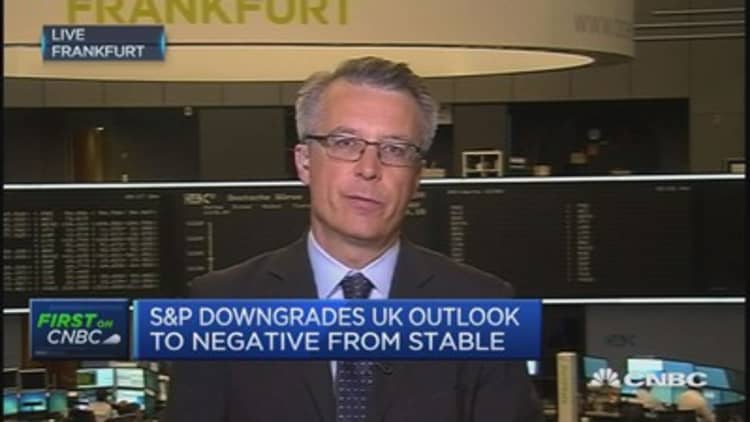
The debate over the U.K.'s future in the European Union has entered a new phase, with both sides in the so-called Brexit vote becoming ever more entrenched.
Arguments over the potential economic consequences of the U.K. voting to quit the 28-country European Union and go it alone took another twist late last week after ratings agency Standard & Poor's downgraded the country's prospects.
So why did the ratings agency make this call?
Rising risk
"What we believe we are observing in the UK is similar to what we saw in the US in 2011 when we downgraded its outlook. Policymaking may be at risk at being subordinated to party politics – being driven not by what is best for the country, but for a particular constituency," Moritz Kraemer, chief sovereign ratings officer at S&P, told CNBC.
The ruling Conservative Party has long had a euroskeptic faction, but as the referendum approaches – it could be any time in the next two years – each side is becoming increasingly strident , threatening the smooth running of a new government.
"The very strong cohesion and predictability of policymaking which has been a hallmark for UK politics for decades is, for the first time, at the risk of being weakened."
The U.K. is at around a third risk of downgrade within the next two years, according to S&P. When the ratings agency restored the U.K.'s credit rating to AAA: Stable in 2014, it was seen as a vote of confidence in the country's economic recovery.
Rumblings from the Scottish National Party (SNP) over the weekend about a new referendum on Scottish independence are a reminder of another risk on the horizon.
Investment concerns
The U.K. has, apart from a blip in 2014 as its currency strengthened, performed well in attracting foreign investment – but this might suffer if it is no longer part of the EU, according to S&P.
"If Britain is no longer part of the largest common market in the world, we think there must be some consequences in terms of decision making by corporate captains," Kraemer said.
London's status as a financial center could be one of the first key economic drivers hit, with banks and funds already drawing up plans to relocate staff in the event of a Brexit, as it is more difficult to access EU markets if you are not based in an EU state.
Aftermath angst
There is "total uncertainty" over what would replace membership of the EU for the U.K., Kraemer pointed out. Pro-Brexit campaigners have argued that the U.K. could move to membership of the European Economic Area, like Norway, and use the added freedom to negotiate its own trade deals with major markets like the U.S. and China.
"These countries have to implement policies without having a seat at the board to decide them," Kraemer warned.
"Britain wants to be careful in losing influence in Europe over the direction of policy."
- By CNBC's Catherine Boyle




